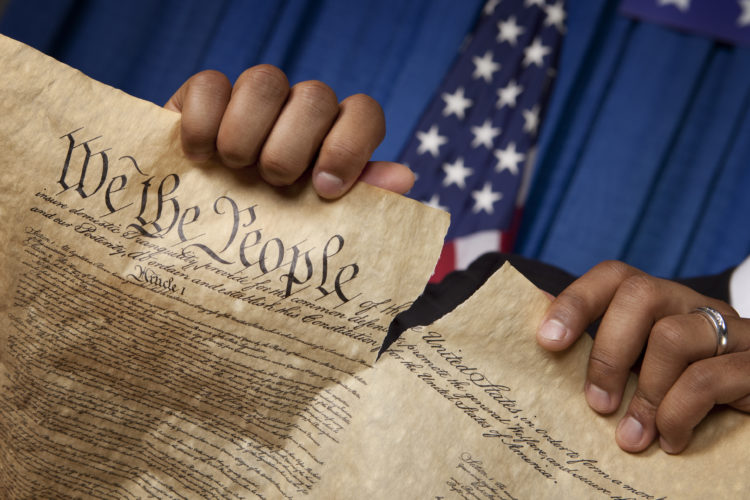Constitutional crisis has no immediate answer, Berkeley Law dean says
Constitutional scholar Erwin Chemerinsky recently feels the crisis we're worried about is here
June 6, 2019

The Constitution is being attacked, says Berkeley Law Dean Erwin Chemerinsky. (Photo by Dieter Spears via Wikimedia Commons)
Until recently, Erwin Chemerinsky, dean of Berkeley Law, didn’t want to be alarmist by shouting “constitutional crisis” from the rooftops.
Not anymore. In the battle between President Donald Trump and the House of Representatives, Chemerinsky is blunt.
“This is a constitutional crisis,” Chemerinsky says, “and we don’t have an answer for it.”
A constitutional crisis can take one of three forms — a crisis of repudiation, an operational crisis or a crisis of fidelity. Chemerinsky, a constitutional scholar, says the United States is acing the third form.
He defines a crisis of fidelity as “those who are governing us not adhering to the constitution.”
“The president is ordering his officials to not cooperate with congressional officials,” Chemerinsky says. “That is keeping Congress from doing its job. That’s obstruction of justice. And we don’t have an answer for it. There’s a consistent violation of the emoluments clause. If the president can violate in those ways, then we have a constitutional crisis.”
Asked what can be done now that Special Counsel Robert Mueller’s report, which has been largely unredacted, potentially shows evidence of obstruction of justice by Trump, Chemerinsky says the ball’s in Congress’ court.
“It would be moral to stand up and take a position. I think, politically, it would help (the Democrats), even if there is no chance for Trump to be convicted in the Senate,” he says.
While the crisis of fidelity is where Chemerinsky points first, the other two legs of the tripod are worthy of note.
He says a crisis of repudiation would be similar to the Brexit debacle in the United Kingdom, with the British about to undergo the search for a new prime minister when Theresa May resigns over her failure to strike a deal on Brexit.

Much of the staff of Berkeley Law was on hand to take in Dean Erwin Chemerinsky’s talk on the perilous state of the U.S. Constitution in May. (UC Berkeley photo)
Chemerinsky says an operational crisis cropped up in December and January when the U.S. government was shut down for 35 days in a dispute between the president and Congress over border wall funding.
Chemerinsky has argued cases in front of the U.S. Supreme Court, most recently in January. He is currently working on a case involving the U.S. Constitution’s emoluments clause, which prohibits members of the government from receiving gifts, or emoluments, from foreign states or monarchies without approval by Congress. Trump has been accused of violating this clause.
In the wake of the constitutional crisis that was Watergate, Chemerinsky explains, Congress passed, and President Jimmy Carter signed, the Ethics in Government Act of 1978, which created the U.S. Department of Justice Office of Special Counsel and tasked it with investigating government officials. The act called for a potential presidential violation of the law to be followed by a three-judge panel appointing an independent prosecutor to look into the matter.
The law lost Republican Party support after Morrison v. Olson, a 1988 case in which President Ronald Reagan withheld documents from Congress concerning the Environmental Protection Agency, only to have the Supreme Court side with Congress. Democrats soured on the Ethics in Government Act after the GOP used it in 1994 in an attempt to impeach President Bill Clinton. The law was allowed to expire in 1999.
“An independent counsel, like Ken Starr, was capable of indicting the president with breaking the law,” Chemerinsky says. “Starr was outside the executive branch of government. In the case of Robert Mueller, he was a special counsel, which is different. He worked in the Justice Department, was a part of the executive branch, and he had to follow departmental guidelines. He couldn’t indict.”
“We are in a deeply polarized time,” Chemerinsky says. “The Republican Party is not standing up to Donald Trump. They know Trump is very popular with the base. Look at what’s happened to the one Republican (Michigan Rep. Justin Amash) who stood up to Trump. The entire Republican establishment tore into him.
“This is a constitutional crisis.”